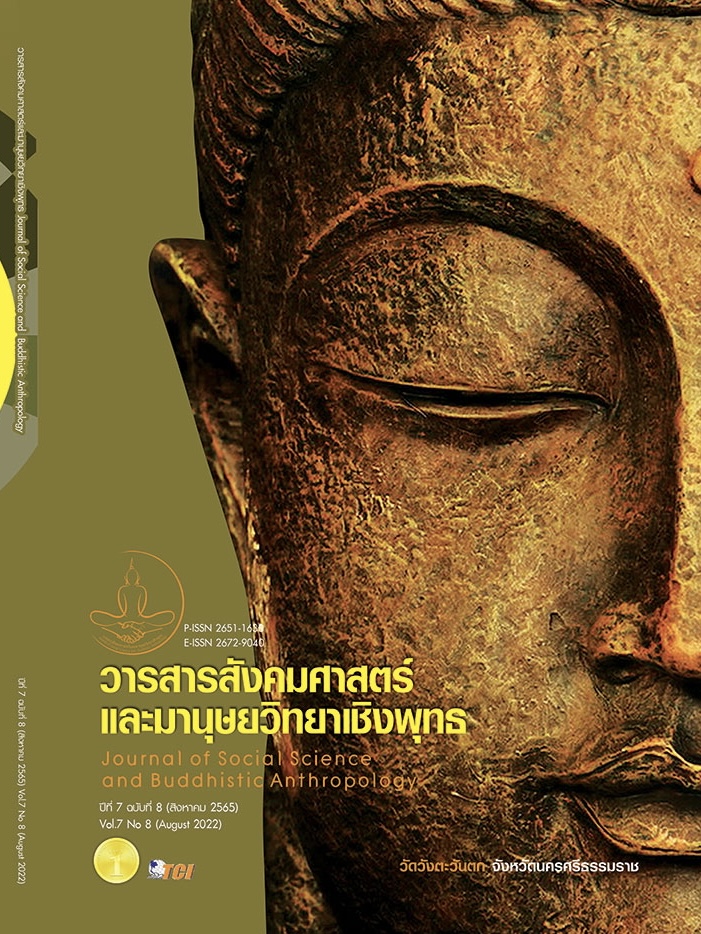DEVELOPMENT OF AN INSTRUCTIONAL MODEL USING ACTIVE LEARNING STRATEGIES TO ENHANCE ANALYTICAL THINKING SKILL AND ENGLISH LEARNING MOTIVATION OF UPPER SECONDARY STUDENTS
Keywords:
Instructional Model, English, Active Learning, Analytical Thinking, MotivationAbstract
The Objectives of this research article were to develop an instructional model using active learning strategies to enhance analytical thinking skill and English learning motivation of upper secondary students and to investigate the results after implementing the developed instructional model whose quality was assessed by 5 professionals. A sample of 28 eleventh-grade students was obtained by using cluster random sampling. The data collection instruments consisted of an instructional model quality assessment form, an analytical thinking skill assessment form, and an English learning motivation assessment form. The quantitative data were analyzed by using mean, percentage, standard deviation, and t - test. Descriptive content analysis was used to analyze the qualitative data. The findings revealed that there were 6 components of the instructional model developed by researcher including 1) objectives, 2) principles, 3) 4 stages of B-TAA model: boosting motivation (B), team learning planning (T), analytical participation (A), and accuracy confirmation (A), 4) learning media and resources, 5) student and teacher roles, and 6) measurement and evaluation. The overall quality assessment of the developed model was found at the highest level (mean = 4.83). The results of instructional model implementation indicated that the students had higher levels of their analytical thinking skills and learning motivation after the implementation at the statistical significance level of .01.
References
ทิศนา แขมมณี. (2557). ศาสตร์การสอน: องค์ความรู้เพื่อการจัดกระบวนการเรียนรู้ที่มีประสิทธิภาพ. (พิมพ์ครั้งที่ 21). กรุงเทพมหานคร: สำนักพิมพ์แห่งจุฬาลงกรณ์มหาวิทยาลัย.
พูลสุข สังข์รุ่ง. (2550). มนุษยสัมพันธ์ในองค์การ. (พิมพ์ครั้งที่ 10). กรุงเทพมหานคร: บี เคอินเตอร์ ปริ้นท์.
มยุรี นะราวัง. (2549). การพัฒนาบทเรียนสำเร็จรูปเพื่อพัฒนาทักษะการอ่านจับใจความวิชาภาษาอังกฤษชั้นมัธยมศึกษาปีที่ 3 โรงเรียนบ้านหัวหมู สำนักงานเขตพื้นที่การศึกษามหาสารคามเขต 2. ใน วิทยานิพนธ์ครุศาสตรมหาบัณฑิต สาขาหลักสูตรและการสอน. มหาวิทยาลัยราชภัฏมหาสารคาม.
วิจารณ์ พานิช. (2556). ผู้เป็นเจ้าของการเรียนรู้ : 1 บทบาทของ นร. และครูที่เปลี่ยนไปในยุค digital learning. เรียกใช้เมื่อ 15 กันยายน 2564 จาก https://www.gotoknow. org/posts/559353
เวียงชัย อติรัตนวงษ์. (2553). การพัฒนาการคิดวิเคราะห์สำหรับนักเรียนชั้นมัธยมศึกษาปีที่ 4 โรงเรียนขามแก่นนคร อำเภอเมือง จังหวัดขอนแก่น. ใน วิทยานิพนธ์ครุศาสตรมหาบัณฑิต สาขาหลักสูตรและการสอน. มหาวิทยาลัยราชภัฏเลย.
ศูนย์ดำเนินงาน PISA แห่งชาติ สถาบันส่งเสริมการสอนวิทยาศาสตร์และเทคโนโลยี. (2021). ปัจจัยที่ส่งผลต่อความสามารถด้านการอ่านและแนวทางในการยกระดับความสามารถด้านการอ่านของนักเรียนไทย. กรุงเทพมหานคร: สถาบันส่งเสริมการสอนวิทยาศาสตร์และเทคโนโลยี (สสวท.).
สมเกียรติ อินทสิงห์. (2562). การพัฒนารูปแบบการจัดการเรียนรู้โดยบูรณาการแรวคิดการเรียนรู้โดยปรากฏการณ์เป็นฐานและกระบวนการคิดเชิงออกแบบเพื่อส่งเสริมความรู้เรื่องหลักสูตรความสามรถในการคิดเชิงนวัตกรรม และแรงจูงใจใฝ่สัมฤทธิ์สำหรับนักศึกษาวิชาชีพครู. ใน รายงานวิจัย. มหาวิทยาลัยเชียงใหม่.
สุวิมล พงษ์พันธ์. (2548). การศึกษาการจัดกิจกรรมการเรียนรู้แบบร่วมมือตามวัฏจักร 4 MAT ในกลุ่มสาระการเรียนรู้สังคมศึกษา ศาสนาและวัฒนธรรมเพื่อส่งเสริมความสามารถในการคิดวิเคราะห์และทักษะกระบวนการกลุ่มแบบร่วมมือ ของนักเรียนชั้นประถมศึกษาปีที่ 4. ใน วิทยานิพนธ์ครุศาสตรมหาบัณฑิต สาขาวิชาหลักสูตรและการสอน. มหาวิทยาลัยราชภัฏนครปฐม.
อนุเบศ ทัศนิยม และ สุมาลี ชูกำแพง. (2563). การพัฒนาความสามารถในการคิดวิเคราะห์ของนักเรียนชั้นมัธยมศึกษาปีที่ 4 ด้วยการจัดการเรียนรู้โดยใช้ปรากฏการณ์เป็นฐาน. วารสารมหาจุฬานาครทรรศน์, 7(6), 31-44.
Ausuble, D. P. (1968). Educational Psychology : A Cognitive view. New York: Holt, Rinehart & Winston.
Bonwell, C. C. & Eison, J. A. (1991). Active learning: Creating excitement in the classroom. Washington, D. C.: The George Washington University.
Chickering, A. W. & Gamson, Z. F. (1987). Seven principles for good practice in undergraduate education. Retrieved February 25, 2561, from http://www.lonestar.edu/multimedia/SevenPrinciples.pdf
Edwards, M. G. (2019). High School Teachers' Perceptions of Developing Critical Thinkers viathe Socratic Method. USA: High School Teachers' Perceptions of Developing Critical Thinkers viathe Socratic Method.
Fatih, M. & Pinar F. (2015). Investigation of factors affecting critical thinking skills. The Business and Management, 6(4), 110-123.
Joyce, B. et al. (2009). Models of teaching. New York: Pearson Education, Inc.
McClelland, D. C. (1985). Human motivation. Chicago: Foresman Scott.
Sanders, J. R. (1994). The program evaluation standards. (2nd ed). Thousand Oaks: SAGEPublications.
Downloads
Published
How to Cite
Issue
Section
License
Copyright (c) 2022 Journal of Social Science and Buddhistic Anthropology

This work is licensed under a Creative Commons Attribution-NonCommercial-NoDerivatives 4.0 International License.









